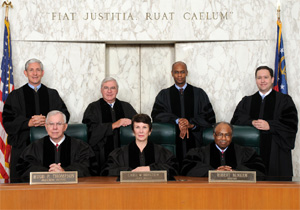State Supreme Court Rules In Favor of Department of Corrections

Supreme Court of Georgia
Last summer, the Georgia Department of Corrections changed the three-drug cocktail used in lethal injection executions.
An appeal was filed on behalf of death-row inmate Warren Lee Hill, Jr.
It claimed the change was illegal.
But today’s decision by the Georgia Supreme Court ruled no violation was committed.
Georgia’s high court ruled the Department of Corrections is not subject to the state’s Administrative Procedure Act.
The statue reads that before changing a rule, an agency must give 30 days’ notice of the intended action.
Also the agency must provide reasonable opportunity to all interested persons to submit opinions or arguments either orally or in writing.
Why is the Georgia Department of Corrections exempt?
WABE legal analyst and criminal defense attorney Page Pate has a theory.
“I think all of the justices were concerned about opening this potentially Pandora’s Box of interference with the regular rule making and decision making authority within in the system of prisons that we have in the state.”
And if there’s ever an issue that should require public hearings says Pate, it’s a change in the drug sedative, in this case Pentobarbital, that’s now solely used in executions.
The state Supreme Court’s ruling also sets a bad standard says Pate.
“Anyone now from any agency can say that look we can make rules and if we choose to make rules then we can abide by the statue, but if we don’t choose to make the rules the way that the statue envisions, then we can avoid the requirements of the statue. That’s not good policy and it’s not good law.”
The Georgia Supreme Court ruling lifts the stay of execution for Hill and a new execution date is likely to be announced very soon.
Another controversy surrounding this case is that Warren Lee Hill, Jr is mentally disabled. The execution of those with mental disabilities is prohibited but; Georgia is the only state that requires proof beyond a reasonable doubt.
9(MDAxODM0MDY4MDEyMTY4NDA3MzI3YjkzMw004))









